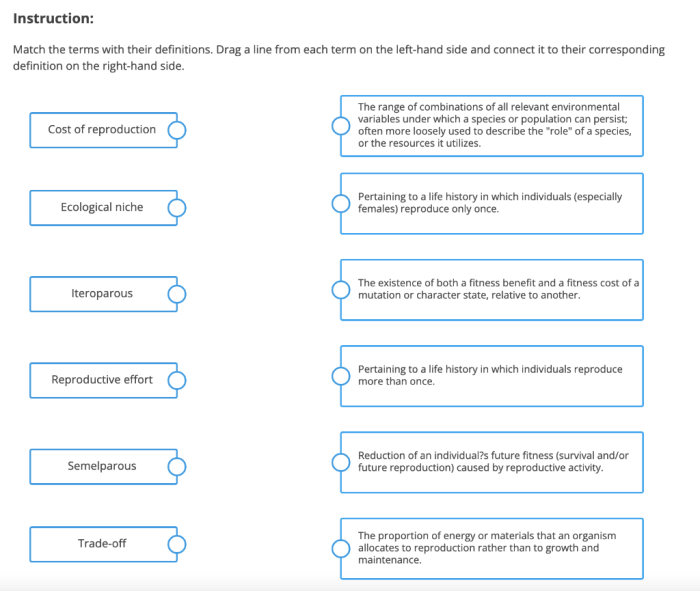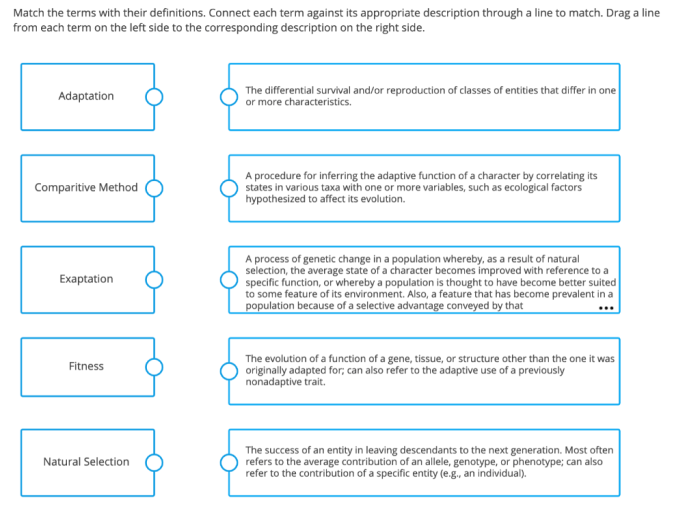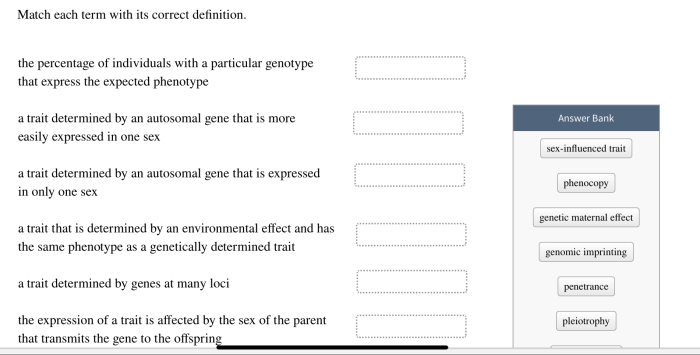Match each term with its definition – Matching each term with its definition is a fundamental exercise that plays a pivotal role in expanding vocabulary, fostering comprehension, and honing critical thinking skills. This guide delves into the concept of term matching, its benefits, methods, challenges, and diverse applications across various domains.
The practice of matching terms with their definitions goes beyond mere memorization; it cultivates a deeper understanding of language and its nuances. By engaging with this exercise, individuals develop the ability to identify and comprehend the precise meanings of words, phrases, and concepts, laying the groundwork for effective communication and critical analysis.
Term Matching Exercise: Match Each Term With Its Definition

A term matching exercise involves matching a set of terms with their corresponding definitions. This type of exercise is commonly used in educational settings to assess students’ understanding of key concepts and their ability to apply their knowledge.
Term matching exercises can be used in various contexts, including:
- Vocabulary building:Matching exercises can help students expand their vocabulary by introducing them to new terms and their meanings.
- Concept comprehension:By matching terms with definitions, students demonstrate their understanding of the underlying concepts and relationships between them.
- Assessment of knowledge:Term matching exercises can be used as a formative or summative assessment tool to evaluate students’ knowledge of a particular subject.
- Review and reinforcement:Matching exercises can serve as a review activity, reinforcing students’ understanding of previously learned material.
Benefits of Term Matching

Term matching exercises provide a multitude of cognitive benefits, enhancing various language skills and critical thinking abilities.
Enhanced Vocabulary:Term matching requires participants to identify and match terms with their corresponding definitions. This process strengthens vocabulary by exposing individuals to new words and their precise meanings, expanding their lexical repertoire.
Improved Comprehension
By associating terms with their definitions, individuals develop a deeper understanding of the concepts and ideas they represent. Term matching helps clarify meanings, reduces ambiguity, and facilitates the comprehension of complex texts.
Critical Thinking
Term matching exercises engage critical thinking skills by requiring participants to analyze, compare, and contrast terms and their definitions. This process sharpens the ability to make logical connections, draw inferences, and evaluate the accuracy and relevance of information.
Methods for Matching Terms
Matching terms with their definitions is a crucial step in understanding and retaining new information. Several methods can be employed to effectively match terms and their definitions, each offering its own advantages and drawbacks. Here are some of the most commonly used methods:
- Using Context Clues:This method involves examining the context surrounding a term to infer its meaning. By paying attention to the surrounding sentences and paragraphs, one can often determine the definition of a term without explicitly looking it up.
- Root Words:Identifying the root words of a term can provide valuable clues about its meaning. By breaking down a term into its constituent parts, one can often deduce its definition based on the meaning of the root words.
- Synonyms:Synonyms are words that have the same or similar meanings. By identifying synonyms for a term, one can gain a better understanding of its definition and usage.
- Antonyms:Antonyms are words that have opposite meanings. By identifying antonyms for a term, one can establish the boundaries of its definition and clarify its usage.
The choice of which method to use will depend on the specific term and the context in which it is encountered. By utilizing a combination of these methods, individuals can effectively match terms with their definitions and enhance their comprehension of new information.
Challenges in Term Matching

Term matching can present several challenges, hindering the accuracy and efficiency of the process. These challenges include:
- Ambiguity and Context Dependence:Terms often have multiple meanings or interpretations depending on the context. Matching terms without considering the specific context can lead to incorrect or incomplete results.
- Synonyms and Homonyms:Synonyms are words with similar meanings, while homonyms are words with identical spellings or pronunciations but different meanings. These linguistic nuances can make it difficult to match terms accurately.
- Abbreviations and Acronyms:Abbreviations and acronyms can be confusing, especially when multiple terms use the same abbreviation or acronym. This can lead to incorrect matches if the context does not provide sufficient clarification.
- Cultural and Language Barriers:Term matching across different cultures and languages can be challenging due to cultural nuances, colloquialisms, and idioms. These factors can introduce ambiguity and make it difficult to find exact matches.
Strategies for Overcoming Challenges
To overcome these challenges, several strategies can be employed:
- Seeking Clarification:When encountering ambiguous or context-dependent terms, it is crucial to seek clarification from subject matter experts, consult reference materials, or use additional information to determine the intended meaning.
- Utilizing Reference Materials:Dictionaries, thesauri, and glossaries provide valuable resources for identifying synonyms, homonyms, and abbreviations. Using these resources can help ensure accurate matching.
- Contextual Analysis:Carefully examining the context in which terms are used can provide valuable clues to their intended meaning. This includes considering the surrounding text, the purpose of the document, and the audience.
- Cross-Referencing:Matching terms across multiple sources or documents can help identify consistent usage and eliminate ambiguity. This approach is particularly useful when dealing with cultural or language barriers.
Applications of Term Matching
Term matching exercises find diverse applications across educational, research, and professional settings. These exercises facilitate effective learning, enhance research accuracy, and support efficient knowledge management.
Education
- Concept Reinforcement:Matching terms to their definitions reinforces students’ understanding of key concepts and vocabulary.
- Assessment Tool:Term matching exercises serve as formative assessments, enabling educators to evaluate students’ comprehension and identify areas for improvement.
- Active Learning:By actively engaging with the material, students develop a deeper understanding and retention of concepts.
Research, Match each term with its definition
- Data Analysis:Term matching aids in the analysis of large datasets by identifying and categorizing relevant terms and concepts.
- Literature Review:Matching terms across multiple research papers facilitates comprehensive literature reviews and synthesis of findings.
- Terminology Standardization:Term matching helps researchers establish consistent terminology within their field of study.
Professional Settings
- Knowledge Management:Matching terms to their corresponding concepts and resources enhances knowledge organization and retrieval.
- Document Classification:Term matching assists in the automated classification of documents into appropriate categories.
- Information Extraction:By matching terms to specific information, term matching exercises facilitate efficient information extraction from unstructured data.
Detailed FAQs
What is the primary objective of term matching exercises?
The primary objective of term matching exercises is to enhance vocabulary, comprehension, and critical thinking skills by fostering a deeper understanding of the precise meanings of words, phrases, and concepts.
How can term matching exercises be beneficial in educational settings?
In educational settings, term matching exercises can aid in vocabulary acquisition, improve reading comprehension, and support the development of critical thinking skills, which are essential for academic success.
What are some common challenges encountered in term matching exercises?
Common challenges in term matching exercises include encountering unfamiliar terms, deciphering ambiguous definitions, and overcoming misconceptions or preconceived notions.